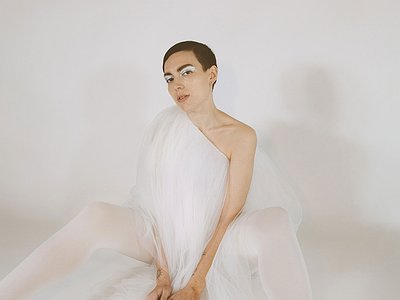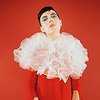Part 1
Name: Drum & Lace (Sofia Hultquist)
Nationality: Italian
Occupation: Composer/Performer/Sound Artist
Current Release: Further on Little Twig Records
Recommendation: Flatland:A Romance of Many Dimensions by Edwin A. Abbott / Max Richter’s Sleep. I was able to experience the music live in-person, during an overnight sleep concert and it left such a profound mark on me.
Website/Contact: For tour and project news and releases, visit the Drum & Lace Website at www.drumandlacemusic.com
When did you start writing/producing music - and what or who were your early passions and influences? What is it about music and/or sound that drew you to it?
From as early as I can remember, I was either singing or humming. I also had a very vivid and wild imagination, and would often be singing outdoors, imagining a scene or movie unfolding. When I was a toddler, I started taking piano lessons, but it was not until I was in college that I really started writing my own music. When I was in school, I would write little songs, but they were certainly not anything to write home about, and I was not focused on wanting to become a composer, but rather just wanted to sing.
My parents, who liked music but weren’t overly into it, both liked blues and classic rock and listened to things along the lines of Ricki Lee Jones, The Rolling Stones and Otis Redding. In retrospect, I also grew up around a lot of classical music being played mainly at my grandmother’s house - she was a big classicist, so it was a lot of Mozart and Bach, with the occasional Wagner and Beethoven.
As with a lot of people growing up in the mid-90s, my music discovery started with pop music, and CDs such as No Doubt (Tragic Kingdom) and Alanis Morrisette (Jagged Little Pill). In high school, three artists really changed the course of what I was into and I think have stayed with me since - these were Joni Mitchell, Radiohead, and Bjork. Interestingly enough, film music wasn’t something I listened to a lot until I was studying composition and film scoring in college.
For most artists, originality is first preceded by a phase of learning and, often, emulating others. How would you describe your own development as an artist and the transition towards your own voice? What is the relationship between copying, learning and your own creativity?
I think when I first started writing my own music, I leaned heavily into wanting to recreate what bands like Radiohead and Air do so effortlessly. I’ve never been great at doing soundalikes and have always had a relatively broad musical love, so very early on I started doing my thing not because it was necessarily intentional, but because I couldn’t quite decide where I wanted my music to live. What this has meant is that a lot of my music often falls within gray areas between genres and between ‘boxes’, which at first was hard because so much of all music industries want to be able to put a label on your ‘sound’. Now I cherish this fact, and like that I have fluidity in what I feel like writing.
What were your main compositional- and production-challenges in the beginning and how have they changed over time?
I think my biggest challenge at first was technology. So much of the music I wanted to write involved the use of electronics and computers, and when I first started college, I nearly failed the ‘intro to music tech’ prerequisite course we had to take. It took a few years and a lot of hard work, but eventually I wound up getting a Master’s in Music Tech. Today I try to be involved with organizations and events that try to promote music technology for young women, as I feel that a lot of my ‘fear’ of technology was from what I was told I should and shouldn’t like when I was a kid.
What was your first studio like? How and for what reasons has your set-up evolved over the years and what are currently some of the most important pieces of gear for you?
I’m not sure you could call my first set-up a studio, as it was one of the walls in my studio apartment in Boston when I was a junior. Over the years the set-up grew as I went from apartment to house and across coasts. As of the last year, my studio is what I have always wanted I built myself a freestanding studio shed in my backyard. In terms of gear, there are a few things that I feel like I use on all my music, including a Moog Grandmother, a Sequential Tempest and my trusted SM58 for my vocal pedal chain.
How do you make use of technology? In terms of the feedback mechanism between technology and creativity, what do humans excel at, what do machines excel at?
Technology is very intertwined with everything that I do artistically, in a way the use of technology in my work has become an extension of the practice as well as a vital part of the execution. One obvious use is using a computer to compose music and as the main way of sharing material on projects. A more obscure use of technology for me is using it in a way to create 3D audio projects and performances. Using technology via speakers and decoding has been something that I think has greatly enhanced my work, because performances that I do that are in 3D ultimately immerse the listener/viewer in a way that isn’t experienced often. Humans excel at being quick on their feet and reacting in an improvisational or spontaneous musical moment. Humans are also able to inject nuance into work in a way that a machine can’t. I do find that the precision and predictability that machines provide though to be important in my work, as the reliability of a machine means I can create more efficiently.
Production tools, from instruments to complex software environments, contribute to the compositional process. How does this manifest itself in your work? Can you describe the co-authorship between yourself and your tools?
I don’t think I would be able to compose without certain production tools which have also helped shape and create whatever you may think ‘my sound’ is. An easy example is field recordings, that I incorporate into most of my composition work. The act of gathering and processing sounds is often what sparks compositional ideas, and very often a sound (looped, chopped up, etc.) will be the starting point and will become a fundamental part of the foundation of a piece. Additionally, these sounds and field recordings are more often than not manipulated, meaning that the software and tools I use to create this manipulation are also essential to the sound. I’d say some of the essential tools for me (software and hardware) are Ableton, PaulStretch, the OndeMagnetic and MaxMSP.
Collaborations can take on many forms. What role do they play in your approach and what are your preferred ways of engaging with other creatives through, for example, file sharing, jamming or just talking about ideas?
The way I collaborate with others varies quite a bit depending on the project I’m on. When composing for film and tv, collaboration can look like a direct co-scoring scenario or simply the hiring of musicians to record the score. With the co-scoring, which I have done numerous times with my partner Ian (Hultquist), it literally means sitting at the same piano and room and composing together. With players I prefer to be able to have them over to record in my studio, but as of late with the pandemic, it’s been crucial to do things remotely and file share using WeTransfer, Google Drive or Dropbox. The big downside with the remote recording is that the spirit of experimentation is lost a little, as it’s not as easy if you’re not in the same room to go on musical tangents. These music tangents can often times lead to new ideas and to new textures and can definitely inform the approach. The upside of remote recording is that it can save a lot of time if you’re in a time crunch, especially if the players are also tech savvy and can comp and do everything themselves.
Could you take us through a day in your life, from a possible morning routine through to your work? Do you have a fixed schedule? How do music and other aspects of your life feed back into each other - do you separate them or instead try to make them blend seamlessly?
Interesting to think how differently I would have answered this a few months ago! On top of the pandemic, I also just had a baby girl at the end of March, so my day in the life is very different right now and I assume will be different from what it has been. In the past, the gist of it would have been wake up, make coffee and in the studio answering emails by 9am. I would have then taken a break for lunch and to walk my dogs in the afternoon, but more or less worked until dinner time and very often into the night. In the wake of everything going on at this very moment, the majority of film/tv work is on hold and having just released an EP (early June) I’ve been spending a lot less time in the studio. Add on top taking care of a baby. Moving forward, when things get back to a sense of ‘normalcy’, I suspect that my attitude towards keeping music and other aspects of my life separate will change, and that I’ll likely have to be more productive with the time I have vs procrastinating a lot each day!






